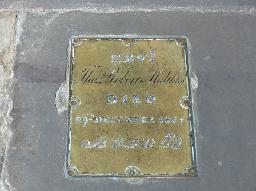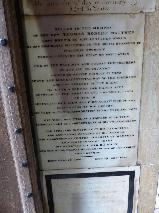Malthus, Thomas Robert |
| ECONOMIST, CLERIC, SCHOLAR (ENGLAND) |
|
BORN 17 Feb 1766, Westcott, Surrey: The Rookery - DIED 23 Dec 1834, Saint Catherine, Somerset (near Bath) CAUSE OF DEATH heart disease GRAVE LOCATION Bath, Somerset: Bath Abbey (north aisle (tomb is covered by pews, memorial in north porch)) |
|
Thomas Robert Malthus was the son of the prosperous Daniel Malthus and his wife Henrietta Catherine born Graham. His mother was the daughter of Daniel Graham (c.1695-1778), the apothecary to kings George II and George II. Daniel's father Thomas Graham (c.1666-1733) was apothecary to George I and George II. Malthus was a pupil of Richard Graves (1715-1804) and from 1784 he was educated at Jesus College in Cambridge where William Friend was his mathematics teacher. In 1791 he took his Master of Arts degree and in June 1793 he was elected a fellow of Jesus College. He had taken orders in the Church of England in 1789 and became the curate of Oakham Chapel in Wotton, Surrey. In 1798 he published "An Essay on the Principle of Population" in which he stated that population would grow faster than the necessary food production. Repressive checks like wars and death by hunger would subsequently reduce the population. It opposed the optimism of others regarding the future improvement of society, and it was also a reaction to writings of William Godwin and the Marquis de Condorcet. The essay was attacked and criticized, but he published six new versions until 1826. In 1799 he travelled in Europe with his college friend William Otter (1768-1840) and in 1802 he visited France and Switzerland during the Peace of Amiens. In 1803 he became the rector of Walesby, Lincolnshire. He married Harriet Eckersall from Bath on 13 March 1804. She was eleven years his junior and had been a member of the party that travelled to France and Switzerland. They had a son and two daughters. Their son Reverend Henry Malthus (1805-1882) married William Otter's daughter Sophia (1807-1889). After his marriage Balthus gave up his tutorship at Jesus College. Malthus became a Professor of History and Political Economy at the East India Company College at Haileybury in Hertfordshire in 1805. He held this post until his death. He was elected a Fellow of the Royal Society in 1818. In 1821 he was a founding member of the Political Economy Club. In 1824 he became a royal associate of the Royal Society of Literature. In 1827 he published "Definitions in Political Economy" in which he criticized contemporary economists including Jean-Baptiste Say, James Mill and John Ramsay McCulloch. McCullough was the editor The Scotsman and he wrote a devastating review that damaged the reputation of Balthus as an economist. In 1834 Malthus joined the newly founded Statistical Society. In the same year he suddenly died of a heart disease on 29 December 1834. He was buried in Bath Abbey. Harriet remarried and survived him for thirty years. Related persons • was published by Johnson, Joseph • was a friend of Martineau, Harriet |
| Images |
Sources • Thomas Robert Malthus - Wikipedia (EN) • Dictionary of National Biography - Wikisource, the free online library |




